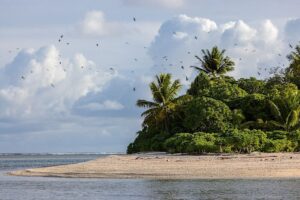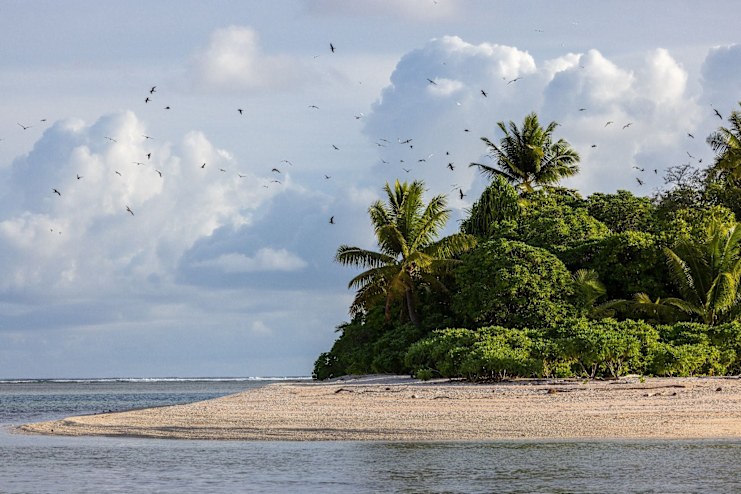A significant ocean expedition is now underway in the Pacific island nation of Tuvalu, led by National Geographic Pristine Seas.

A team of over 15 scientists and filmmakers has embarked on a months-long research mission to study the health of Tuvalu’s marine environments. The expedition’s primary goal is to gather critical data that will inform and advance ocean conservation efforts and support the Tuvalu government in developing its National Ocean Policy to ensure the protection of its vital waters.
Introducing Tuvalu: A Nation Vulnerable to Climate Change
Tuvalu is a small, low-lying island nation located in the Pacific Ocean, comprising six atolls and three reef islands. It is widely recognized as one of the countries most vulnerable to the impacts of climate change, particularly rising sea levels and coastal erosion. The physical threats posed by these environmental changes underscore the urgency of understanding and protecting the surrounding marine ecosystems that are integral to Tuvalu’s existence and its people’s way of life.
A Mission for Ocean Conservation
The National Geographic Pristine Seas expedition in Tuvalu is a collaborative effort, undertaken in partnership with the Tuvalu Government. The core mission is to conduct extensive research on the current state of Tuvalu’s marine health.
Data collected during the expedition will be shared directly with the Tuvalu government, providing the scientific foundation needed to inform effective ocean management plans and assist officials in making crucial decisions about which parts of their ocean territory to designate for protection. This expedition comes at a crucial time as Tuvalu is actively in the process of developing its comprehensive National Ocean Policy.
Exploring Tuvalu’s Understudied Waters
The expedition team will explore a vast range of Tuvalu’s ocean environments, from the sunlit lagoons and vibrant coral reefs to the mysterious depths of the deep sea. A significant portion of these waters, particularly the deep sea habitats, have never been studied in-depth before. The research aims to provide a comprehensive picture of the biodiversity and ecosystem health across these varied zones.
Studying these “little-known” areas is crucial for potentially discovering new species, understanding previously unexplored ecosystems, and identifying key biodiversity hotspots that warrant special conservation attention.
Advanced Research Technology Deployed
To conduct this extensive research, the expedition is utilizing state-of-the-art technology. For studying the deep sea, the team is deploying cameras that sit on the ocean floor to capture footage of marine life in the abyssal zone. A key tool is their advanced submersible, the Argonauta.
Described as an underwater science lab, the Argonauta can dive to depths of 1,300 meters, enabling passengers to view ocean life from every angle in real-time and conduct scientific observations directly in the deep sea. Using these deep-sea cameras and the submersible, the team will undertake some of the first-ever assessments of Tuvalu’s deepest ocean habitats.
For surveys in shallower and mid-water areas, scientists are working aboard Pristine Seas’ research vessel, the Argo. From the Argo, they will use baited remote underwater video systems (BRUVs), which attract marine life to cameras with bait, providing valuable data on species presence and behavior.
Scientists will also conduct SCUBA surveys for direct observation, counting, and identification of marine species on coral reefs and in lagoons. Additionally, they will count and identify seabirds, which are indicators of the health of the wider marine ecosystem.
Documenting Tuvalu’s Rich Marine Life
Tuvalu’s waters are home to a rich array of marine life, encompassing hundreds of species that inhabit the coral reefs, lagoons, and open ocean surrounding the nation’s atolls and islands. Notable species include silky sharks, giant clams, bumphead parrotfish, various types of tuna, and Hawksbill turtles.
The data collected during the expedition’s surveys will be used by scientists to estimate the abundance of these and other marine life species in Tuvalu, including assessing the populations of threatened species such as humphead wrasse, baramundi cod, and Herman sea cucumbers. Documenting this biodiversity is fundamental for effective conservation planning.
Threats to Ecosystems and Communities
The marine ecosystems of Tuvalu, and the human communities who depend on them, face severe threats driven by climate change. Rising sea levels directly threaten the low-lying islands with inundation and exacerbate coastal erosion, impacting land and infrastructure. These changes also stress marine habitats; for example, warming ocean temperatures and acidification contribute to coral bleaching and reef degradation.
Since coastal communities rely on healthy marine ecosystems for food security (fishing), cultural practices, and coastal protection, these environmental threats have profound implications for their survival and way of life.
The Protective Role of Marine Protected Areas
A key strategy in marine conservation is the establishment of Marine Protected Areas (MPAs) – designated zones where human activities are restricted to varying degrees to protect marine life and habitats. MPAs can serve as safe havens for fish populations to breed and grow, protecting critical habitats like coral reefs, mangroves, and seagrass beds.
Tuvalu currently has one nationally designated marine protected zone, the Funafuti Conservation Area, which covers 33 square kilometers of reef, lagoon, and islets on the western side of the Funafuti atoll. National Geographic Pristine Seas hopes that the comprehensive data collected during this expedition will provide the scientific basis and impetus to empower the creation of more marine protected areas in Tuvalu.
As Keiron Fraser, Pristine Seas expedition leader for Tuvalu, stated, healthy coral reef ecosystems can act as natural barriers, protecting families and communities from the destructive effects of sea level rise, flooding, and coastal erosion. Working with local scientists, the expedition aims to identify areas that could benefit most from marine protected areas and help build resilience against a warming planet.
Local Involvement and Sharing Knowledge
Tuvaluan scientists are playing an integral role in the expedition, contributing directly to the research efforts and sharing their invaluable traditional knowledge of the ocean. This local involvement is crucial for ensuring the research is relevant to Tuvalu’s context and for building local capacity in marine science and conservation.
Tuvalu’s leaders have voiced strong support for the expedition and its goals. Prime Minister Hon. Feleti Teo emphasized the deep connection of the ocean to Tuvalu’s livelihood, home, and ancestry, stressing the need for robust marine biodiversity data, especially in unstudied areas, to effectively protect the ocean for future generations.
Minister of Environment Hon. Maina Vakafua Talia welcomed the partnership, noting that the National Geographic Pristine Seas expedition will build upon and complement the existing research and traditional knowledge of their home, the Pacific Ocean, as they fulfill their moral obligation as custodians of an ocean under threat.
Studying Regional Ocean Connectivity
Tuvalu’s geographic location, situated between other Pacific Island Nations like Fiji, Rotuma, and Vanuatu, provides the expedition team with a unique opportunity to study how ocean ecosystems are interconnected across the region. Scientists believe that shallow areas on the ocean floor, such as underwater plateaus or ridges, likely act as natural pathways connecting marine life populations between these island nations.
Whitney Goodell, lead scientist for deep sea research during the Tuvalu expedition, explained that the ocean ecosystem is entirely connected, and no one part is isolated. Understanding and safeguarding areas that support important regional linkages is crucial for effective conservation that spans beyond national borders and contributes to the health of the wider Pacific marine environment.
A Documentary Film and Educational Outreach
Throughout the expedition, National Geographic Pristine Seas filmmakers are capturing footage for a documentary film. The film aims to showcase Tuvalu’s deep cultural relationship with the ocean and its bold vision for the future amidst the challenges of climate change.
It will center on the voices and stories of the people who live in Tuvalu, including elders, youth, fishers, scientists, and leaders, sharing their experiences of life on land and at sea.
Through scenes depicting daily life, cultural traditions, and the scientific discoveries made during the expedition, the film will explore how the people of Tuvalu are working to protect their resources, uphold their identity, and forge a path towards ocean stewardship and climate change resilience.
In addition to the documentary, the expedition includes an educational component in collaboration with the Tuvalu Ministry of Education. Educators and students will have the opportunity to visit the research vessel Argo for “Ship Days,” allowing them to meet the scientists, filmmakers, and crew, learn more about marine science, and explore potential exciting career paths in related fields.
Part of a Larger Global Expedition
The Tuvalu expedition is part of a much larger initiative by National Geographic Pristine Seas – a five-year Global Expedition that began in 2023 with a mission to explore the tropical Pacific. The overarching goal of this multi-year endeavor is to conduct scientific research in this incredibly biodiverse region and support communities and governments in their efforts to protect the ocean. The Tuvalu expedition is the tenth stop on this ambitious Global Expedition.
Previous stops have included exploring and studying waters around the Southern Line Islands, Tongareva, Niue, The Republic of the Marshall Islands, the Federated States of Micronesia, Palau, Papua New Guinea, and the Solomon Islands. The Global Expedition is scheduled to continue exploring other areas, with plans to study the waters of Fiji and Rotuma from April to September of 2025.
Gathering Data for Tuvalu’s Ocean Future
The launch of the National Geographic Pristine Seas ocean expedition in Tuvalu is a critical step towards enhancing the understanding and protection of this vulnerable nation’s marine environment.
By conducting extensive research across understudied areas from deep sea to coral reefs, utilizing advanced technology, and working in close partnership with the Tuvalu Government and local scientists, the expedition is generating vital data needed to inform conservation efforts and support the development of Tuvalu’s National Ocean Policy.
The expedition also highlights the significant threats posed by climate change, the crucial link between healthy marine ecosystems and community resilience, and the importance of regional ocean connectivity.
Through scientific discovery, local involvement, and a forthcoming documentary, the Tuvalu expedition contributes significantly to broader Pacific regional conservation efforts and raises global awareness about the urgent need to protect the ocean for the future of vulnerable island nations like Tuvalu.







